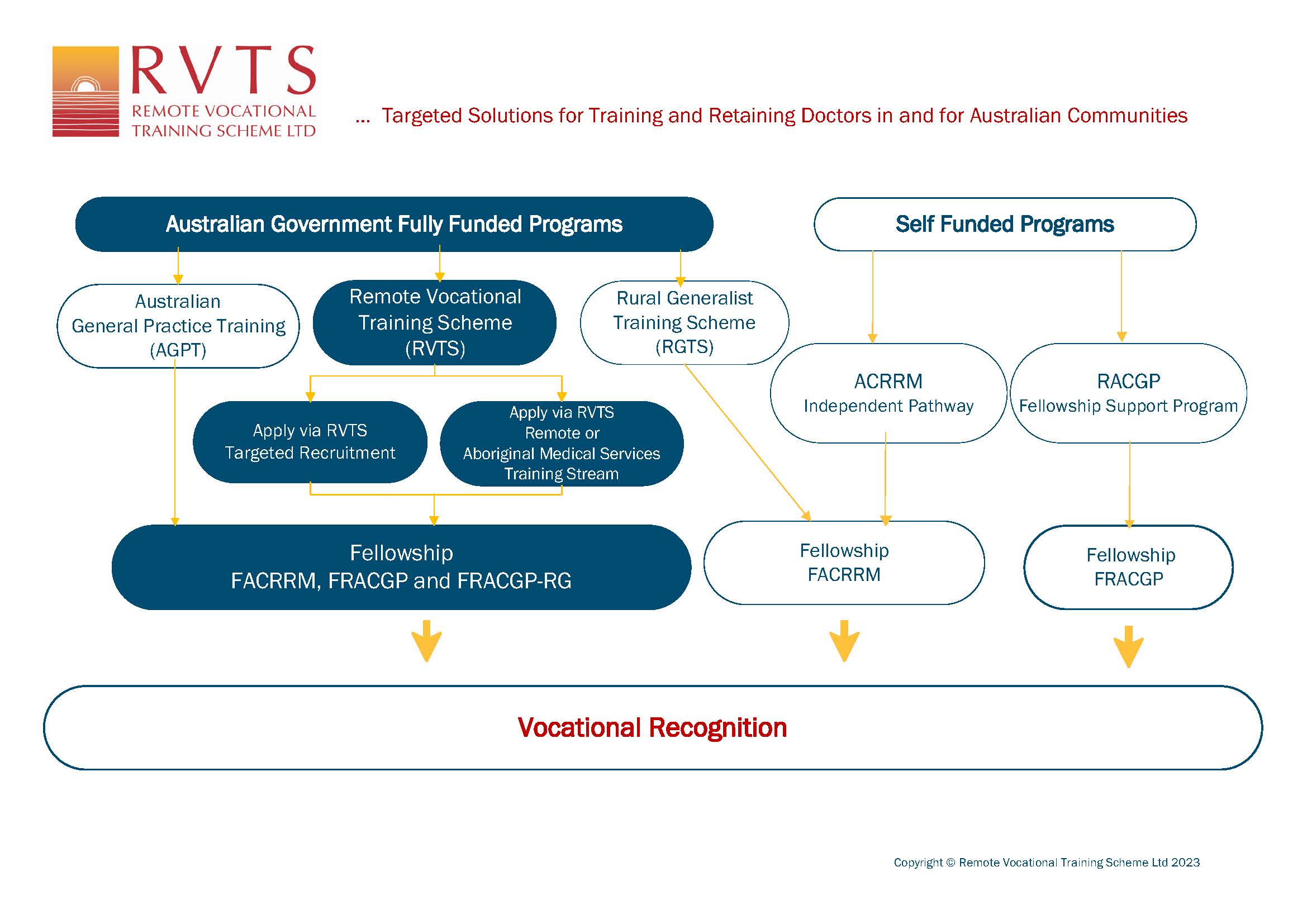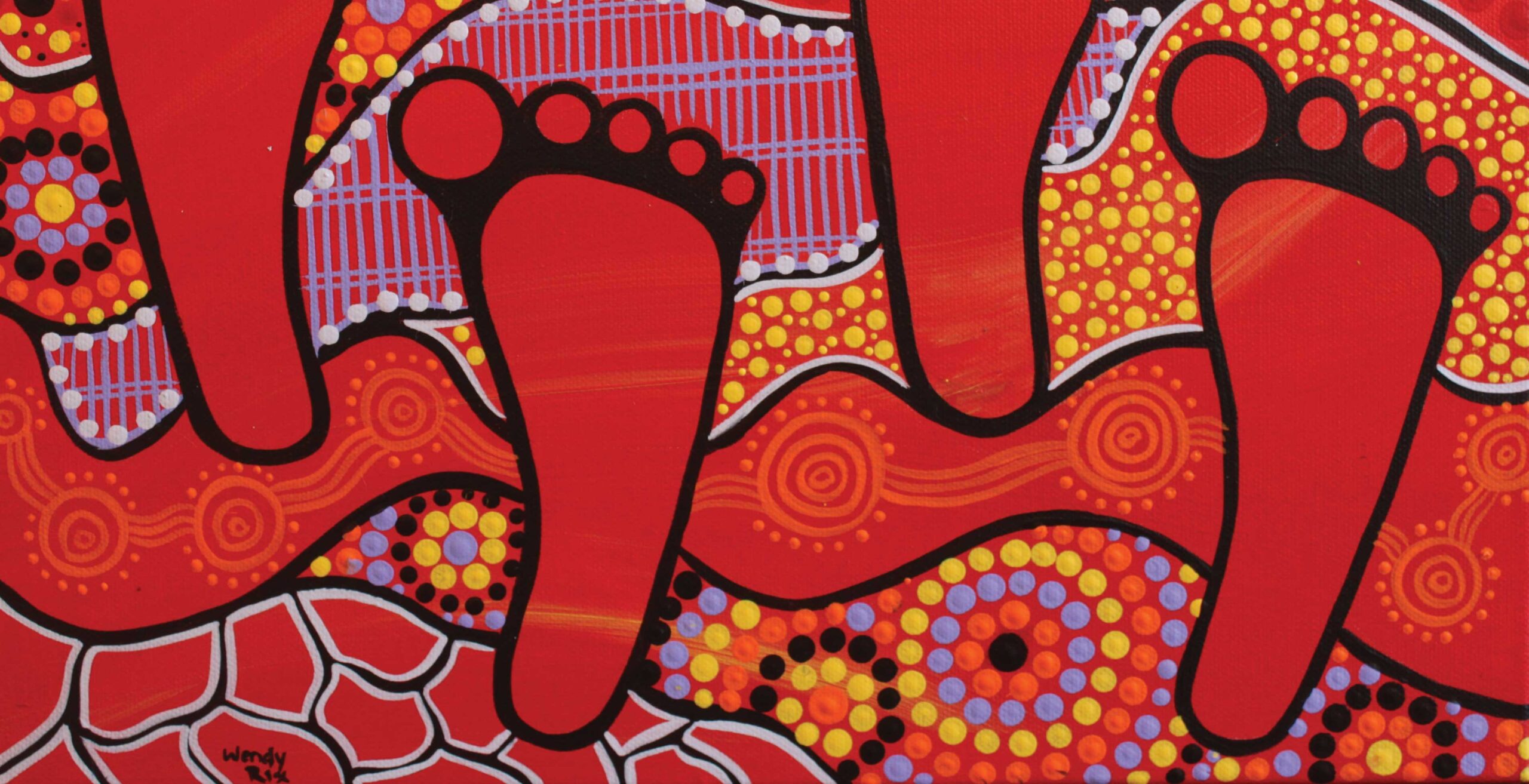Applying to the RVTS training program
Continue to care for your community while completing Fellowship training.
Achieve vocational recognition with Fellowship of the Royal Australian College of General Practitioners (RACGP) and/or the Australian College of Rural and Remote Medicine (ACRRM).
RVTS is an independent, Government-funded national vocational training program that facilitates access to medical education and training in circumstances where it may not otherwise be possible. With RVTS training, your community and patients retain their doctor as you advance your career.
RVTS conducts two intakes with training commencing in January and July each year.
Select from two training Streams:
- the Remote Stream for Doctors in remote and rural Australia (MMM4-7), and
- the AMS (Aboriginal Medical Service) Stream for Doctors in Aboriginal Community Controlled Health Services (MMM2-7).
Some of the positions on the Remote Stream and the AMS Stream may be filled through the RVTS Targeted Recruitment process which is focused on designated locations of high workforce need. Find out more and discover what you can achieve with the support of RVTS training. Enquire now and be ready to apply online for the next intake.
Key dates for selection
| 2025.1 | |
|---|---|
| Applications Open | 12 August 2024 |
| Applications Close | 1 September 2024 |
| Situational Judgement Test | 16-20 September 2024 |
| Interviews | 1-3 October 2024 |
| Training Commences | 20 January 2025 |
RVTS eligibility
TopRVTS offers two training streams:
- The Remote Stream for doctors working in rural and remote Australia in MMM4-7 locations.
- The AMS Stream for doctors working in Aboriginal Community Controlled Health Services in MMM2-7 locations.
The Applicant Guide for each training stream includes important information on eligibility and selection into the RVTS program.
-
Remote Stream Applicant Guide
-
AMS Stream Applicant Guide
-
RVTS Targeted Recruitment Applicant Guide
Applicants can also apply via the RVTS Targeted Recruitment Strategy
Eligibility criteria are summarised as follows:
1. Practice location
Refer to the Australian Government Department of Health Health Workforce Locator
Remote Stream
The practice must be in Modified Monash Model (MMM) 4, 5, 6 or 7.
AMS Stream
The location must be an Aboriginal Community Controlled Health Service AND must be in Modified Monash Model* (MMM) 2, 3, 4, 5, 6 or 7, or a State or Territory Health Service as specified in Table 1:
State and Territory Health Services eligible for the RVTS AMS Stream
| Training Facility Name | |
|---|---|
| NSW | Jullums - Lismore Aboriginal Medical Service |
| NT |
Northern Territory Health, including:
|
| QLD | Queensland Health, Torres Strait and Northern Peninsula Area Health Service District - Bamaga Hospital |
| QLD | Queensland Health, Torres Strait and Northern Peninsula Area Health Service District - Thursday Island Hospital |
| QLD | Queensland Health, Torres Strait and Northern Peninsula Area Health Service District - Thursday Island Primary Health Care Centre - Community Wellness Centre |
| QLD | Queensland Health, Townsville Health Service District - Joyce Palmer Health Service |
2. Practice status
For both Streams, the position must be providing continuing comprehensive whole-patient medical care to individuals, families and their communities.
3. Medical registration
Doctors must have:
- General, Provisional or Limited Registration for Area of Need with the Australian Health Practitioner Regulation Agency (AHPRA). AND
- be at Medical Board of Australia Level 3 or 4 supervision. (Note: Levels 1 and 2 are not eligible for the RVTS Training Program)
For doctors with limited registration:
- the doctor must be on the Australian Medical Council Standard Pathway and have completed the Australian Medical Council part 1 exam AND
- limited registration needs to have been granted on or after 22 July 2023.
4. Residency Status
Applications are accepted from Australian citizens, permanent residents and temporary residents. Temporary residents should have adequate time left on their visa to complete the training program and are required to provide evidence of their application for permanent residency.
Recent Experiences with RVTS
Hear from our doctors.
 Play video
Play video
Training with RVTS
The RVTS Program syllabus has been structured to address the practical issues faced by medical practitioners in rural, remote, and First Nations communities across Australia.
With RVTS you have an opportunity to pursue dual Fellowship as the RVTS syllabus incorporates the RACGP Curriculum and the ACRRM Primary Curriculum.
How does the RVTS program fit in with the Australian GP Training Program (AGPT)?
Remote Supervision is the hallmark of the Remote Vocational Training Scheme.
The Remote Vocational Training Scheme is similar to the Australian General Practice Training Program (AGPT) in that it provides vocational training towards Fellowship of both ACRRM and RACGP. However, RVTS training is delivered under a remote supervision model which enables the doctor to stay in the one location.
AGPT registrars will usually experience working across several different practices over the course of their training, with support from the local and regional training program teams.

Working in a practice or health service in a rural, remote or First Nations community? With RVTS, you can stay in your community for the duration of your GP or RG training.
For over 25 years, we have facilitated access to educational opportunities for Doctors where it may have otherwise not been possible.
Registrars training in the RVTS program enjoy:
- Collegiality: Peer support and a sense of belonging to a special group, with opportunities for regular contact with doctors in similar situations
- High-quality training support: All registrars are supported by:
- An experienced and committed remote supervisor
- An experienced team of Medical Educators
- A Medical Educator Mentor
- An individual training ‘case manager’ / Registrar Training Coordinator (RTC)
- A team of Cultural Educators and Cultural Mentors.
- Family support
The RVTS Training program includes:
- Live weekly webinars: 60-90-minute education sessions each week delivering core clinical content, interactive and peer learning.
- Remote supervision: Each registrar is allocated a supervisor who acts as a mentor, providing educational advice
- Face-to-face workshops: Twice a year, registrars attend a residential procedural skills workshop
- Onsite and tele Clinical Teaching Visits: An RVTS supervisor or experienced rural practitioner sits in on a registrar’s consultations to observe progress and provide constructive feedback.
- Cultural Education and Mentoring: Cultural safety training is provided by RVTS for registrars, supervisors and staff.
- eLearning resources: modules: Self-directed modules, study material and interactive discussion forums
- Exam Preparation

Become the best Doctor you can be
Upon successful completion of the RVTS Training program, you will:
- Have attained comprehensive knowledge, skills and attitudes for unsupervised general practice in Australia;
- Be awarded the FACRRM and/or the FRACGP and have had the opportunity to train toward the FRACGP-RG;
- Have remained in a rural, remote or First Nations community throughout your training; and
- Be confident and competent in providing sustainable healthcare services and leadership to rural, remote or First Nations communities.
We have a young family and we are both doing training - the flexibility that the RVTS program offered us is the most appealing part of it. It has been excellent that we have been able to stay in the same place while we study.
Frequently asked questions
Top-
Registrars training with the RVTS can nominate to train towards ACRRM and/or RACGP Fellowship. At the time of applying, candidates must indicate their intended Fellowship pathway.
Recognised Prior Learning: Registrars training with RVTS can apply to either or both Colleges for recognition of prior learning (RPL).
Learn more about RACGP Fellowship requirements and ACRRM Fellowship requirements.
-
The RVTS Remote Stream is funded for 22 doctors per year with up to eleven positions offered across two intakes each year in January and July.
The RVTS AMS Stream is funded for 10 doctors per year with up to five positions offered across two intakes each year in January and July.
Some Remote Stream and AMS Stream positions may be filled through the RVTS Targeted Recruitment process, which is focused on designated locations with high medical workforce needs.
-
Yes. This is one of the greatest benefits of training with RVTS – there is no need to move. It is a win-win situation for both you, your family and your community.
-
No. Doctors who have Fellowship of ACRRM and/or RACGP are ineligible to apply for the RVTS training program.
-
You can apply for the RVTS General Practice and Rural Generalist training program online during selection rounds.
Be sure to read the relevant Applicant Guide before applying to check your eligibility, and to understand what supporting documentation needs to be uploaded with your application.
-
If you are unsuccessful in previous intakes, you are eligible to apply for subsequent intakes. For example, if unsuccessful in 2024.1 (January intake) you can reapply for 2024.2 (July intake).
-
Remote Supervision is the hallmark of the Remote Vocational Training Scheme.
The Remote Vocational Training Scheme is similar to the Australian General Practice Training Program (AGPT) in that it provides vocational training towards Fellowship of both ACRRM and RACGP. However, RVTS training is delivered under a remote supervision model which enables the doctor to stay in one location.
AGPT registrars will usually experience working across several different practices over the course of their training, with support from the local and regional training program teams.
Fellowship Pathways

Learn more about training with RVTS




